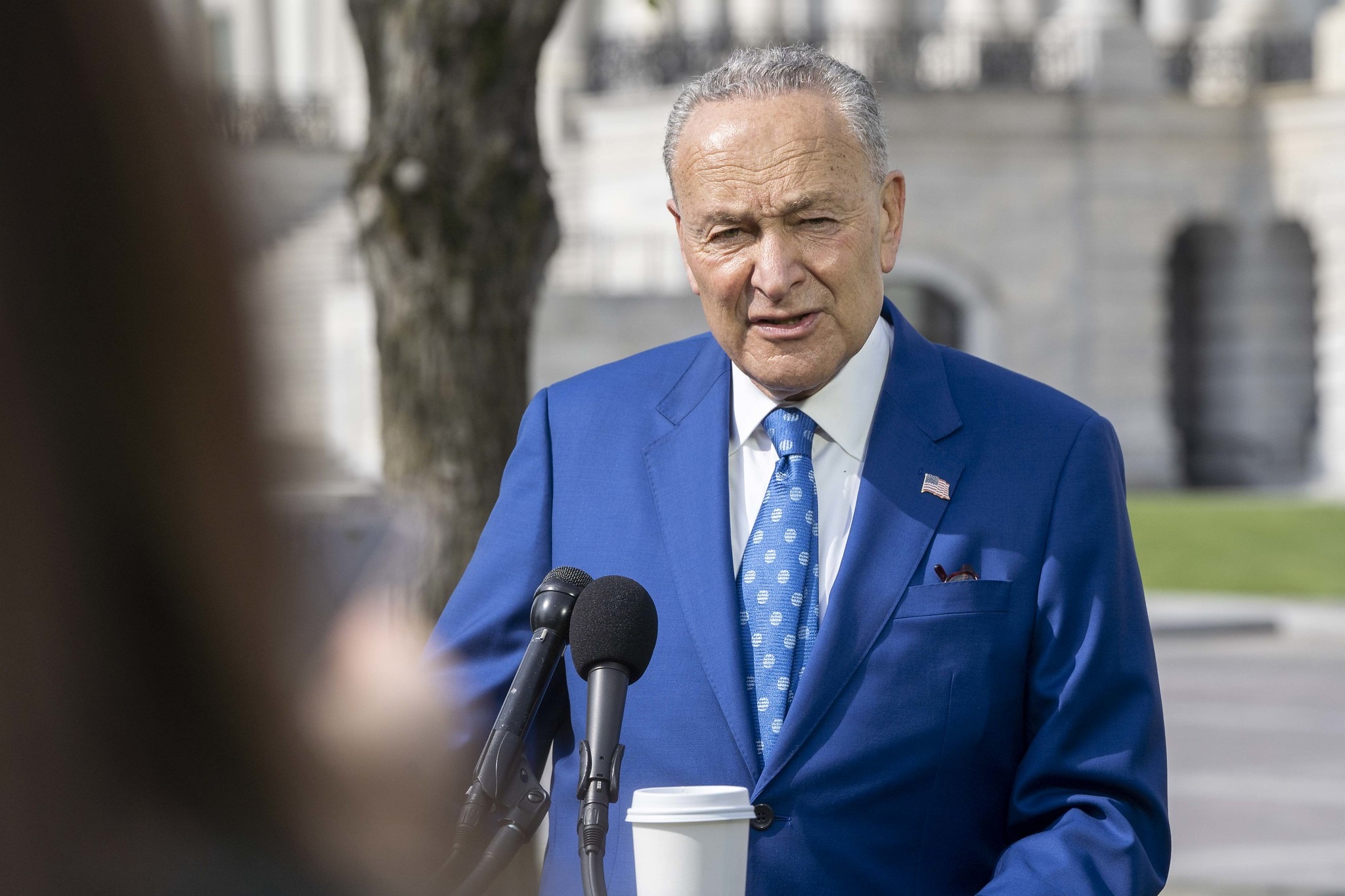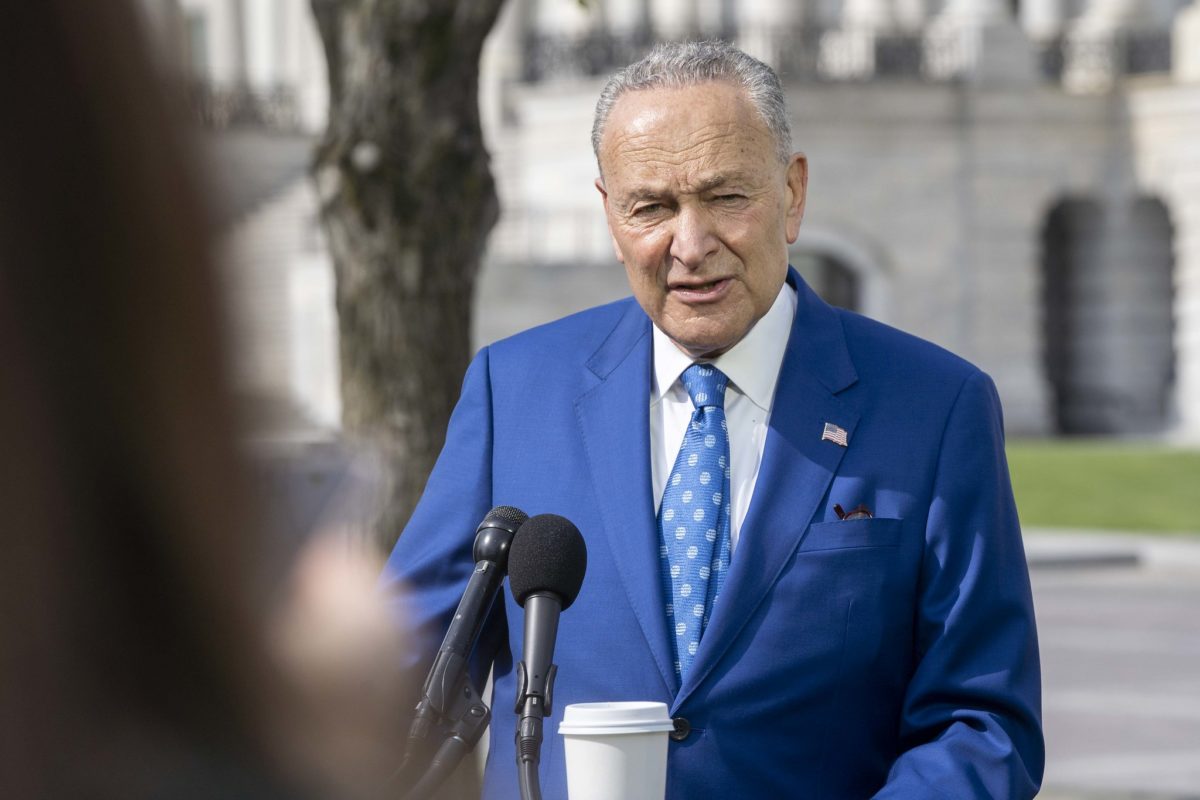Newsletter
More Money to Police ‘Hate Crimes’ Won’t Stop Mass Shooters
New “domestic terror” laws will do little to stop gun violence in America, but may pacify suburban white voters.


More Money to Police ‘Hate Crimes’ Won’t Stop Mass Shooters
by Nneka Ewulonu
On May 26, the U.S. Senate voted down the “Domestic Terrorism Prevention Act of 2022,” a proposal championed by Senate Majority Leader Chuck Schumer that would have generally required the FBI, DOJ, and DHS to fund “whatever amounts are necessary” to ramp up so-called “domestic terror” investigations across the country.
“Today, the Senate is voting on the Domestic Terrorism Prevention Act to help combat a serious cause of gun violence: Domestic terrorism and white supremacy,” Schumer tweeted shortly before the vote occurred. “It will give the government the tools to monitor, find, and arrest evil actors before they have a chance to inflict violence.”
While further ratcheting up hate-crime laws may be a popular idea among establishment Democrats, an important point must be made: hate-crime laws do not appear to be working to stop white-supremacist violence, and instead, only appear to funnel money to police officers instead of the sorts of social services that could actually address the underlying reasons why people commit acts of mass violence.
Ramping up hate-crime and so-called “domestic terror” provisions does little more than pacify mostly white, suburban voters—the kind that Schumer and his ilk openly prioritize—by making it seem like his party is Doing Something Serious about combating terrorism, when in fact statistics show these methods do little to solve the underlying issues at play at all.
Federal recognition of hate crimes is nothing new. On July 1, 1870, the Department of Justice was created to handle litigation and civil rights enforcement nationwide after the Civil War. The department’s first mission was tackling the KKK, and to great success; in the first few years of the DOJ’s existence, hundreds of klansmen were arrested, at times even encountering majority-Black juries, and imprisoned.
As Reconstruction faltered, however, civil rights fell onto the government’s backburner until the mid-20th Century Civil Rights Movement, when decades of movement building brought about the end of (institutionalized and legal) segregation, anti-miscegenation laws, and poll taxes. Nearly three decades later, the U.S. Supreme Court ruled in 1993 that it is constitutional to increase sentences for people found to have committed crimes based on bigotry. The following year, President Bill Clinton signed the deeply criticized “Violent Crime Control and Law Enforcement Act” (better known as the “1994 Crime Bill”), which ratcheted up criminal penalties “not less than three offense levels” for anyone found to have committed a hate-crime at the federal level.
But these sentencing enhancements have not stopped or deterred many “hate crimes” from occurring—especially in hate-based mass shootings, where perpetrators often seem willing or even plan to be shot dead by law enforcement. In 2021, the FBI reported that there were 7,759 hate crimes, the highest number recorded since 2008. This figure, however, is often seen as a severe underestimate. A 2021 report from Movement Advancement Project estimated that, between 2013 and 2017, an average of 204,600 hate crimes occurred a year, but only 45,600 of those incidents were reported to police by the victim and described by victims as hate crimes. From there, the police designated only 15,200 as hate crimes. However, federal hate crime “reporting” requirements are weak and many law enforcement agencies report crimes either incorrectly or not at all. Local police ultimately only reported 7,500 so-called hate crimes to the FBI annually.
Even the 7,500 hate crimes reported to the FBI have flaws. While data suggests white people commit the majority of hate crimes in America, the FBI reported that Black people are disproportionately charged with committing hate crimes. In 13 states, Black people were listed as hate-crime offenders at rates 1.6 to 3.6 times the size of the states’ respective Black populations. The tools created to protect marginalized identities are instead being wielded disproportionately against those very same communities.
Whether by legal or societal designation, we should of course acknowledge the bigoted motivations of crimes when they occur. The intent of hate crime laws may be sincere, but their impact falls short. In a legal system that is so fundamentally unequal, hate crime designations are at best, a pat on the back, and at worst, the majoritarian state’s way of pacifying marginalized communities.
White, cisgender, heterosexual males sit atop of an American societal hierarchy that has historically been enforced by the cruel dehumanization and subjugation of marginalized communities. And while today the state no longer openly and directly sponsors these harms, the state also has no incentive to combat rogue hate-based violence.
Despite the fact that Right-wing and white-supremacist terrorists have committed the majority of “domestic terror” incidents for decades, the federal government did not introduce a strategy for combatting this current wave of violent extremism until 2021. Even that plan is largely problematic: while it aims to improve information literacy and some public-health-based approaches to countering violent extremism, significant other portions of the plan include increasing funding for state and federal law enforcement.
A recent study warned that a third of Americans believe the racist, antisemitic “Great Replacement” conspiracy theory—the idea promoted by both Fox News host Tucker Carlson and the shooter in Buffalo on May 14 that Jewish people, people of color, and immigrants are intentionally displacing white populations in western countries. It’s clear that this nation’s current mixture of political speeches, thoughts and prayers, and trending hashtags will not adequately address hate-based violence.
When hate-based mass shootings occur, a common refrain is that you can’t legislate away hate. But, as Martin Luther King Jr stated, “it may be true that the law cannot change the heart but it can restrain the heartless.” A recent study from Northwestern Medicine found that the Federal Assault Weapons Ban prevented 10 mass shootings while it was in effect, but could have prevented 30 mass shootings had the Ban not expired. Ironically, four years after the Ban’s expiration, the Supreme Court held, for the first time in American history, that the Second Amendment constituted an individual right to bear arms, a right arguably not found in the historical analysis and original intent of the amendment. The accessibility of guns may not cause individuals to subscribe to hateful ideology, but it is nonsensical to deny the harm caused by comparatively easy-to-access machines quite literally designed to injure or kill.
Today’s hate crimes from individual actors have replaced state-sponsored discrimination. Instead of fearing violence at polling places and lunch counters, we fear grocery stores, bible study, or simply going on a jog in our neighborhoods. Every incident furthers marginalized peoples’ fears to exist in public spaces; every subsequent pacifying act by the state—like indicting the Buffalo shooter on terrorism and hate-crime counts, while still allowing individuals to buy assault rifles like the ones used at Buffalo and Uvalde—perpetuates that terror.
In the news
Contact us at newsletter@theappeal.org so we can feature your work here.
Between 2014 and 2019, 18 Illinois corrections employees who misused force or sexually harassed people incarcerated in the state’s prisons remained on staff. [Shannon Heffernan / WBEZ, ProPublica]
Adam Johnson writes on the role of white liberals in the campaign to recall San Francisco District Attorney Chesa Boudin: “The ‘I’m a progressive, but …’ demographic emerged, speaking the language of social justice,” he wrote. “But when it came to actually locking fewer people up in jail and prison, when it came to actually supporting electeds like Boudin who worked to decrease the incarcerated population, they balked.” [Adam Johnson / San Francisco Chronicle] From The Appeal: The Chesa Boudin Recall Was a Fight to Preserve the Status Quo
A panel of three Trump-appointed judges upheld an eight-year prison sentence handed down to climate activist Jessica Reznicek. [Natasha Lennard / The Intercept]
Ethics advisory board members for Taser manufacturer Axon Enterprise Inc. (formerly Taser International) resigned over the company’s now scuttled plans to equip drones with stun guns to combat mass shootings. [Jeffrey Dastin and Paresh Dave / Reuters]
New York City Mayor Eric Adams, who has decried the city as dangerous and led the charge to roll back bail reform, said people think crime is worse than it is because of sensationalistic headlines. “Eric Adams is right to push back against the Eric Adamses of the world,” writes Nick Pinto. [Nick Pinto / Hell Gate]
ICYMI—From The Appeal
In-person visitation is still banned at NY’s Broome County jail. The sheriff says it’s about COVID, but as Elizabeth Weill-Greenberg reports, the policy has raked in big profits, as detained people turn to costly phone and video calls to keep in touch with loved ones.
That’s all for this week. Feel free to leave us some feedback, and if you want to support our relaunch, please donate here.
